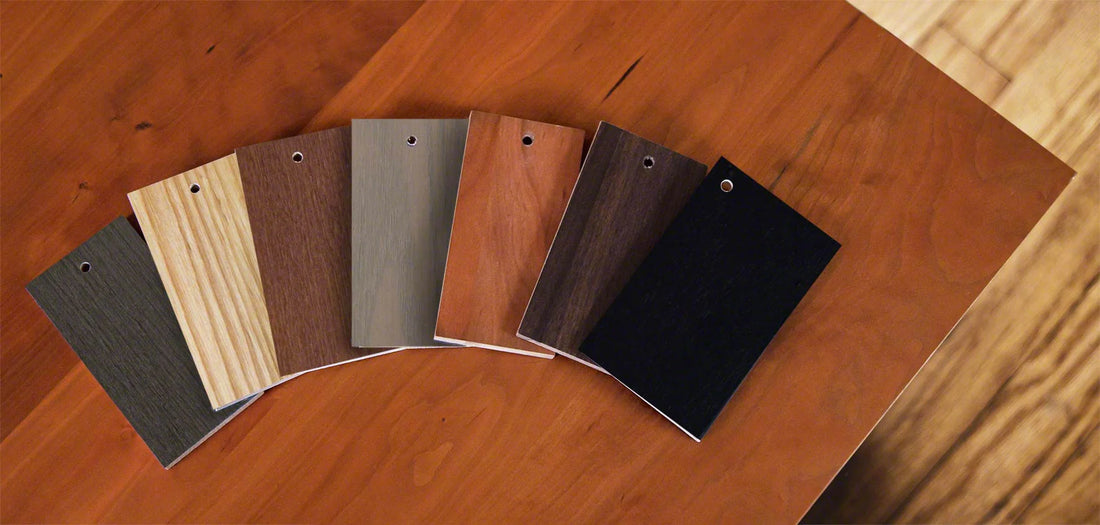Wood is generally an earth friendly material because it is a renewable resource, meaning it grows back naturally and isn’t finite like oil, metals, or even rocks like marble and granite. But not all species of wood are inherently sustainable.
Woods that grow locally like maple, oak, cherry, walnut, ash, pine, and others travel short distances between harvesting and processing and are taken from sustainably managed forests in the US.
But that’s not the case for many types of woods that come from different parts of the world. The term “exotic hardwoods” refers to woods that originate in other parts of the world (often tropical forests), and the impact of using these woods is high.
Did you know that the harvesting of certain species of wood is linked to organized crime, sex trafficking, corruption, human rights violations, illegal logging, species extinction and climate change?
On top of all that, once the hardwoods are clear-cut from the rainforest, the logs then have to be shipped across the world for manufacturing and distribution. This extreme amount of transportation, leads to a high amount of greenhouse gases being emitted into the atmosphere.
If you are looking for more environmentally sound solutions for all the issues listed above, we recommend buying American made wood products with domestic hardwoods.
Here are some of the most common exotic woods and the top reasons to avoid them.
Purpleheart

Purpleheart, commonly known for its beautiful purple hue, is also known for its strength and durability as a hardwood. Because of its desired purple color, the purpleheart is becoming increasingly rare and on the verge of extinction in its native origins of Central and South America.
The harvesting of purpleheart contributes to deforestation within the Amazon rainforest, demolishes the homes of indigenous peoples, threatens already endangered wildlife, and feeds international crime rings in regards to illegal logging practices.
Purpleheart is commonly found in turnery, expensive furniture, specialty items, cabinetwork, park benches, framing, musical instruments.
Learn more about purpleheart.
Rosewood

Often called the ‘ivory of the forest,’ rosewood is the most widely traded illegal product in the world today. Not only does rosewood grow in endangered forests, but this tree species takes many decades to grow to a viable size for commercial manufacturing, and centuries to reach full maturity. With the incredibly high demand for rosewood furniture in China, rosewood trees have been harvested to the brink of extinction in China, Southeast Asia, Africa and now Madagascar.
The illegal trafficking of rosewood in Madagascar has become so efficient that once a conservation group or local concerned citizens find out about the illegal practices, all of the best and most mature rosewood trees are already cut down. This is extremely problematic because Madagascar is an incredibly rich and diverse biosphere, home to many, already endangered wildlife, like the lemurs. Tall rosewood trees act as nesting areas for lemurs, when they are removed, lemurs are forced out of their native homes that they use for protection and resting from predators.
Rosewood is commonly found in veneer for decorative plywood, cutlery handles, picture frames, billiard cues and craft items, as well as larger furniture pieces in China.
Learn more about rosewood.
Ramin

Ramin is a strong, light-colored wood with fine texture that grows natively in the Borneo rainforest in Southeast Asia. It’s most commonly found in furniture, moldings, plywoods, flooring, dowels, tool handles, drying racks, picture frames — and often stained to match veneers of more valuable species.
Read more about ramin.
Teak

Teak is a glossy hardwood, often marketed as the ‘gold standard’ for outdoor flooring, furniture and doors due to it’s rot-resistant properties. However, the environmental cost of teak is high. Native to Southeast Asia, specifically Thailand, India, and Indonesia, teak trees are now endangered due to over-harvesting.
Demand is so high for teak wood that commercial plantations have sprung up in Latin America and parts of Africa, and while this may sound like a good thing, these plantations are replacing rich, biodiverse tropical forests with monocultures.
Learn more about teak.
Mahogany

Mahogany, known for its elegant look with pink or reddish-brown hues, is also durable and easy to work with. Traditional Honduran Mahogany, or Broad-Leaf Mahogany, which is the most common type of Mahogany used in furniture, only grows in tropical forests in Central and South America, and it has been driven to the brink of extinction by illegal logging of the Amazon and surrounding forests.
Additionally, there are over 70 species of mahogany native to Asia, with more than 50% endangered or critically endangered, and five species of African Mahogany are either endangered or vulnerable.
Learn more about mahogany.
At Vermont Woods Studios, we make sure that our makers source our wood domestically in North America, where we know it was sustainably harvested in forests that are managed to be around for generations to come. Shop our entire collection of eco-friendly, American made wood furniture.


